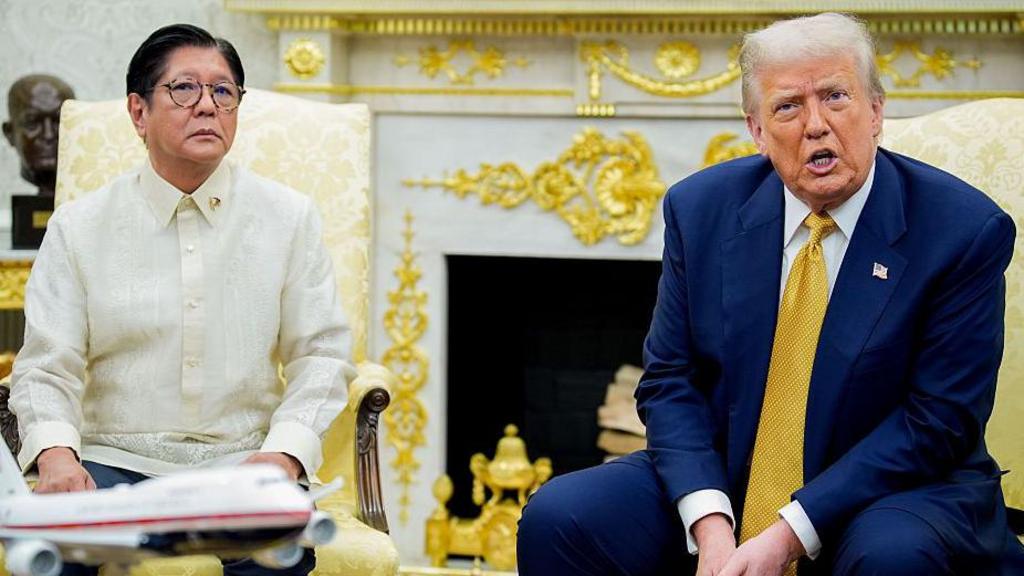“`html
The United States will impose a 19% tariff on imports from the Philippines, according to an announcement from U.S. President Donald Trump following a meeting with the Philippine president at the White House.
President Trump stated on social media Tuesday that the new tariff is part of a broader agreement, wherein the Philippines would eliminate duties on U.S. goods and the two nations would engage in military cooperation.
“It was a beautiful visit, and we concluded our Trade Deal,” he posted, offering no further details regarding the apparent accord.
The proposal, which has not been immediately confirmed by the Philippines, would subject the country to a tax even higher than what President Trump initially threatened when he announced sweeping global tariffs in April.
The BBC has reached out to the Philippines Embassy in Washington D.C. for comment.
President Trump has stated that his objective in implementing tariffs is to encourage countries to abandon policies he deems unfair to the U.S. His initiatives have triggered a series of trade discussions with nations worldwide.
He has since unveiled a number of agreements, including those with the UK, China, and Indonesia. However, these agreements have largely maintained high tariffs, with critical issues either unresolved or unconfirmed by both parties.
With President Trump now threatening a new round of increased duties set to take effect on August 1, some of America’s largest and most crucial trade partners, including the European Union and Canada, remain in uncertainty.
As prospects for a deal diminish, European officials are increasingly coalescing around potential retaliatory measures.
In Canada on Tuesday, Prime Minister Mark Carney acknowledged that “complex negotiations” are ongoing, but refrained from committing to reaching an agreement by President Trump’s deadline next week.
“We’ll see,” he told reporters following a meeting with premiers in Ontario. “The Americans objectives are multiple, they change over time … but what is clear is that the Canadian government will not accept a bad agreement. The objective is not to have an agreement at any cost.”
President Trump’s tariff plans initially triggered widespread financial disruption when they were announced in April, outlining a proposal that would result in the highest U.S. duties since the early 1900s.
He subsequently suspended some of the plan’s most aggressive elements, while retaining a universal 10% tariff on most goods and separately imposing higher duties on specific items, such as cars, copper, steel, and aluminum.
However, in recent weeks, as markets have stabilized and the U.S. economy has remained steady, President Trump has returned to plans for increased duties, sending letters to countries outlining plans for new tariffs that he asserts will take effect on August 1.
In a letter to Philippine leaders this month, he indicated that he would levy a 20% tariff on the country’s goods, an increase from the 17% rate he had threatened in April.
The Philippines represents a relatively small trade partner with the U.S., exporting approximately $14.2 billion worth of goods to America last year, including car parts, electric machinery, textiles, and coconut oil.
Meanwhile, the cost of the new tariffs is increasing for companies.
General Motors disclosed on Tuesday that tariffs had cost it more than $1 billion over three months, following an earlier disclosure from rival Stellantis, maker of Jeep, which stated that the measures had cost it €300m (£259.6m, $349.2m).
Fans in Los Angeles share how Osbourne’s music shaped their lives and inspired them.
The sugar industry has long been protected and now Trump has given it another shot in the arm by pressing Coca Cola.
Ethiopia has repeatedly said the megadam, a major source of pride in the country, was totally self-funded.
It comes weeks before he and his brother are expected at a parole hearing, after decades in US prison.
Clothes matching those of Raymond Ashcroft, who disappeared while visiting Maya ruins, were found at the scene.
“`

